This article was co-authored by Padam Bhatia, MD. Dr. Padam Bhatia is a board certified Psychiatrist who runs Elevate Psychiatry, based in Miami, Florida. He specializes in treating patients with a combination of traditional medicine and evidence-based holistic therapies. He also specializes in electroconvulsive therapy (ECT), Transcranial Magnetic Stimulation (TMS), compassionate use, and complementary and alternative medicine (CAM). Dr. Bhatia is a diplomat of the American Board of Psychiatry and Neurology and a Fellow of the American Psychiatric Association (FAPA). He received an MD from Sidney Kimmel Medical College and has served as the chief resident in adult psychiatry at Zucker Hillside Hospital in New York.
There are 17 references cited in this article, which can be found at the bottom of the page.
This article has been viewed 84,709 times.
Antidepressants are commonly used alongside other forms of therapy to treat depression. It is difficult to know whether your antidepressant medications are working because they may take a while to start functioning properly. Typically, they take four to six weeks to start working.[1] Once your medications start working, you may notice some of the side effects and eventually benefits like more energy and a more positive outlook on life. If your medications do not work for you or result in too many side effects, you may need to switch antidepressants. Common antidepressants include selective serotonin reuptake inhibitor (SSRIs), serotonin and norepinephrine reuptake inhibitors (SNRIs), and norepinephrine and dopamine reuptake inhibitors (NDRIs) as well as older drugs like tricyclics and tetracyclics.[2] Your doctor will give you advice on whether your antidepressant is working and what your alternatives may be, depending on your condition.
Steps
Identifying Signs that Your Antidepressant is Working
-
1Practice patience. You need to be patient, since it can take a while to determine the right medication for you and it may take a few tries. You should give your medication four to six weeks to start working.[3]
- Recognize the long timeline. Antidepressants take different amounts of time to start working for different people. You may notice some benefit from a medication after only a day or two. However, it may take four to six weeks for the antidepressant to kick in.
- If your antidepressant has not started working after six weeks, you should speak to your doctor about alternative medications.
-
2Watch for improvement in your symptoms. Use a diary to keep track of your symptoms on a daily basis. If you felt like your future was hopeless prior to starting the medication, you might want to consider how you feel about your future after taking the medication for two weeks. If you feel like you are slow and have a hard time concentrating, see if these symptoms have changed at all while on the medication.
- Use a depression screening test to track your symptoms. You can find depression screening scales online. Complete the symptom questionnaire and view your results to see if they change over time.[4]
- You can also use health diaries or mobile applications to track your symptoms.
Advertisement -
3See if you feel any better. If you start to have more energy for the day and feel less depressed, this is a sign that your medication has started working. If you feel better after two to six weeks, this can be a very good sign.
-
4Identify side effects. Although the drug may be helping with some of your symptoms, it may also be resulting in side effects. You should pay attention to both any improvements and any side effects. Although the new wave of antidepressant types such as selective serotonin reuptake inhibitors (SSRIs) and serotonin and norepinephrine reuptake inhibitors (SNRIs) have relatively fewer side effects than older types of medications, they still involve many side effects. These side effects commonly include a lower sex drive, a dry mouth, nausea, insomnia, anxiousness and restlessness, gaining weight, sleepiness, constipation and diarrhea.[5] Typically, side effects will emerge prior to the benefits of the treatment. However, you should also tell your doctor if you are experiencing side effects.
- If your side effects do not go away, you should talk to your doctor about alternative depression medication.[6]
- If some of your symptoms are getting better but you are experiencing unpleasant side effects, you should talk to your doctor.
-
5Watch for warning signs that the antidepressant is not working. It is important to look for signs that your antidepressant is not working. There are a variety of warning signs such as mood swings, suicidal thoughts and increased energy accompanied by the blues. In particular, keep an eye out for the following signs that your antidepressant is not working:[7]
- If you feel you have way more energy but still feel down, this may be a bad sign. Some medications start working but do not function correctly for your condition. If this is the case, you will have more energy but will still feel blue. Talk to your doctor if this is the case.
- If you feel better right away after starting a medication, it may be a sign that the medication may be inappropriate for you. It usually takes a while for antidepressants to influence your brain chemistry. If you feel immediate improvement, you may be experiencing a side effect or placebo effect. In either case, talk to your doctor.
- If your depression gets worse or you start to experience horrible mood swings, this is a sign that your antidepressant is not working properly. You should talk to your doctor.
- All antidepressants carry an increased risk of suicidal thinking and behavior in children, adolescents, and young adults between the ages of 18 and 24 during the first two months. If you or someone you know is contemplating suicide, has worsening depression, or has behavioral changes, contact a doctor immediately. Do not stop taking your medication unless your doctor tells you to.
Tracking Your Symptoms with an Application
-
1Purchase a mental health application. A variety of mobile applications are available that help you track your depression. These applications have a variety of tools that can help you monitor your depression, learn new activities and communicate your experience to a medical professional.
-
2Download the Start application. The Start application, which is designed by Iodine and part of Apple’s Care Kit medical development tools, helps you track depression. It lets you share your data directly with a medical professional.[8] You take a short questionnaire at two week intervals, which is called the Patient Health Questionnaire. Taking the questionnaire helps you determine whether your symptoms have improved. You use the application for six weeks, and then use the results to decide with your doctor whether the medication is working.[9]
-
3Track your mood with the CBT Self-Help Guide. This is a smart phone diary application that helps you track how you relate and respond to events throughout your day. You write about events in your life, related moods and intensities. This can help you track your depression while taking an antidepressant. If you start it prior to taking an antidepressant, you can use the diary application to determine if your mood has improved after starting an antidepressant.[10]
-
4Download MoodKit. This application helps you monitor your mood and learn mood enhancing activities. It can be helpful for mild depression, but is not useful for people with moderate or severe depression.[11] In any case, it can be one tool, amongst others, to help you track your mood while taking antidepressants.
-
5Use the T2 Mood Tracker. This application helps you monitor your emotional states and includes a great graphing feature. It can help you monitor your depression so that you can more accurately report your experience to a mental health professional.[12] With accurate tracking and reporting to a mental health professional, you will have a better sense of whether or not the antidepressant is working.
- What’s My M3. This application helps you monitor your “M3 score,” which is a number that helps your doctor determine whether or not your mood disorder is treatable.[13] By tracking your M3 while on antidepressants, you can communicate your M3 score to your doctor.
Talking to Your Doctor or Psychiatrist
-
1Communicate your experience of the antidepressant. Tell your mental health professional how you are feeling in response to the medication. If you have been using a mental health application, use the data you have gathered from monitoring your response to the antidepressant.
- If you use a diary, review your diary prior to visiting your mental health practitioner. By reviewing your diary, you will have a better sense of your moods, emotions, and responses to the medication.[14]
- If you have been using the same antidepressant for a long time and it isn’t working like it once did, you should tell your doctor.[15]
- Over time, your body may develop a tolerance to your antidepressant. This may cause your symptoms of depression to return. If you believe this is happening, talk to your doctor. They may adjust your dosage or change your medication.
-
2Ask your mental health professional. Using the information you gather from monitoring your mood while on the antidepressant, your doctor should be able to determine whether or not your antidepressant is working. Be sure to tell your doctor about any benefits you experience as well as any side effects that you are experiencing.[16]
- Tell your doctor if you skipped any doses. Skipping doses is one cause of a faulty antidepressant, so you need to communicate that information to your doctor.[17]
- If you are taking other drugs or alcohol while on medication, you need to tell your doctor. This can be another reason for an antidepressant to stop working.
- If you are experiencing severe side effects, you may need to switch medications.
- Do not change your dosage or stop taking your antidepressant without consulting your doctor. Suddenly quitting the medication could worsen your depression or cause withdrawal symptoms. Your doctor can help you by slowly and safely decreasing the dose, if needed.[18]
-
3Inquire into alternative antidepressants. According to a large study, only 37% of people got better after trying just one antidepressant.[19] Your doctor should be able to determine whether or not your current antidepressant is working or whether you need to try a different type of medication.
- The most popular antidepressants are SSRIs and SNRIs. Another common medication is bupropion, which belongs to a class of antidepressants known as NDRIs. Bupropion is used for depression, seasonal affective disorder and quitting smoking.[20]
- In addition, there are older types of depression medications such as tricyclics, monoamine oxidase inhibitors and tetracyclics. People respond differently to depression medication so you need to work out a treatment plan with your doctor for your specific condition. You might need to try a different type of antidepressant if your current one is not working.[21]
-
4Consider psychotherapy. Combining antidepressant drug therapy with mental health counseling like psychotherapy is usually more effective than taking the drug alone.[22] There are multiple forms of psychotherapy that might help. These include:
- Cognitive Behavior Therapy: this form of therapy helps you change your way of thinking by identifying how you currently perceive the world and yourself. The therapist will help you create healthier patterns of thinking.
- Interpersonal Therapy: this form of therapy helps depression caused by family conflict, loss, relationship problems, social isolation, and major life events such as giving birth.
- Psychodynamic Therapy: the therapist helps you resolve unconscious conflicts, like childhood trauma.[23]
Expert Q&A
-
QuestionWhat happens when your antidepressant stops working?
 Padam Bhatia, MDDr. Padam Bhatia is a board certified Psychiatrist who runs Elevate Psychiatry, based in Miami, Florida. He specializes in treating patients with a combination of traditional medicine and evidence-based holistic therapies. He also specializes in electroconvulsive therapy (ECT), Transcranial Magnetic Stimulation (TMS), compassionate use, and complementary and alternative medicine (CAM). Dr. Bhatia is a diplomat of the American Board of Psychiatry and Neurology and a Fellow of the American Psychiatric Association (FAPA). He received an MD from Sidney Kimmel Medical College and has served as the chief resident in adult psychiatry at Zucker Hillside Hospital in New York.
Padam Bhatia, MDDr. Padam Bhatia is a board certified Psychiatrist who runs Elevate Psychiatry, based in Miami, Florida. He specializes in treating patients with a combination of traditional medicine and evidence-based holistic therapies. He also specializes in electroconvulsive therapy (ECT), Transcranial Magnetic Stimulation (TMS), compassionate use, and complementary and alternative medicine (CAM). Dr. Bhatia is a diplomat of the American Board of Psychiatry and Neurology and a Fellow of the American Psychiatric Association (FAPA). He received an MD from Sidney Kimmel Medical College and has served as the chief resident in adult psychiatry at Zucker Hillside Hospital in New York.
Board Certified Psychiatrist If this happens and you haven't been adjusting the doses or anything, it's time to call your psychiatrist or doctor and get in to see them as soon as you possibly can. This may be frustrating if it happens, but they'll walk you through the potential solutions.
If this happens and you haven't been adjusting the doses or anything, it's time to call your psychiatrist or doctor and get in to see them as soon as you possibly can. This may be frustrating if it happens, but they'll walk you through the potential solutions. -
QuestionWhat helps with antidepressive withdrawal?
 Padam Bhatia, MDDr. Padam Bhatia is a board certified Psychiatrist who runs Elevate Psychiatry, based in Miami, Florida. He specializes in treating patients with a combination of traditional medicine and evidence-based holistic therapies. He also specializes in electroconvulsive therapy (ECT), Transcranial Magnetic Stimulation (TMS), compassionate use, and complementary and alternative medicine (CAM). Dr. Bhatia is a diplomat of the American Board of Psychiatry and Neurology and a Fellow of the American Psychiatric Association (FAPA). He received an MD from Sidney Kimmel Medical College and has served as the chief resident in adult psychiatry at Zucker Hillside Hospital in New York.
Padam Bhatia, MDDr. Padam Bhatia is a board certified Psychiatrist who runs Elevate Psychiatry, based in Miami, Florida. He specializes in treating patients with a combination of traditional medicine and evidence-based holistic therapies. He also specializes in electroconvulsive therapy (ECT), Transcranial Magnetic Stimulation (TMS), compassionate use, and complementary and alternative medicine (CAM). Dr. Bhatia is a diplomat of the American Board of Psychiatry and Neurology and a Fellow of the American Psychiatric Association (FAPA). He received an MD from Sidney Kimmel Medical College and has served as the chief resident in adult psychiatry at Zucker Hillside Hospital in New York.
Board Certified Psychiatrist It's really important that you stay in touch with your therapist or whoever prescribed you medication so they can check for symptoms coming back.
It's really important that you stay in touch with your therapist or whoever prescribed you medication so they can check for symptoms coming back.
References
- ↑ https://www.nimh.nih.gov/health/topics/mental-health-medications/index.shtml
- ↑ https://www.nimh.nih.gov/health/topics/mental-health-medications/index.shtml
- ↑ Padam Bhatia, MD. Board Certified Psychiatrist. Expert Interview. 3 April 2020.
- ↑ http://psychcentral.com/quizzes/depquiz.htm
- ↑ https://www.nimh.nih.gov/health/topics/mental-health-medications/index.shtml
- ↑ http://www.huffingtonpost.ca/2014/03/05/antidepressant-side-effect_n_4906610.html
- ↑ https://www.huffingtonpost.ca/2014/03/05/antidepressant-side-effect_n_4906610.html
- ↑ http://thenextweb.com/apple/2016/04/28/start-tracking-diabetes-depression-apples-first-carekit-apps/
- ↑ https://themighty.com/2016/08/start-app-can-help-tell-if-your-depression-medication-works/
- ↑ https://play.google.com/store/apps/details?id=com.excelatlife.depression&hl=en&gl=US
- ↑ https://www.ncbi.nlm.nih.gov/pmc/articles/PMC4795320/
- ↑ https://www.healthnavigator.org.nz/apps/t/t2-mood-tracker-app/
- ↑ https://adaa.org/node/2554
- ↑ http://www.webmd.com/depression/features/writing-your-way-out-of-depression#1
- ↑ https://www.mayoclinic.org/diseases-conditions/depression/expert-answers/antidepressants/faq-20057938
- ↑ Padam Bhatia, MD. Board Certified Psychiatrist. Expert Interview. 3 April 2020.
- ↑ https://www.webmd.com/mental-health/news/20000504/dont-mess-with-your-antidepressant
- ↑ http://www.mayoclinic.org/diseases-conditions/depression/in-depth/antidepressants/art-20046273?pg=2
- ↑ http://www.huffingtonpost.ca/2014/03/05/antidepressant-side-effect_n_4906610.html
- ↑ http://www.mayoclinic.org/diseases-conditions/depression/in-depth/antidepressants/art-20046273?pg=1
- ↑ https://www.nimh.nih.gov/health/topics/mental-health-medications/index.shtml
- ↑ Padam Bhatia, MD. Board Certified Psychiatrist. Expert Interview. 3 April 2020.
- ↑ http://my.clevelandclinic.org/health/articles/psychotherapy-for-depression
About This Article
It can be difficult to know if your antidepressants are working since it can take a while to see positive effects and these may be masked by some common side effects. Try to give your medication 4 to 6 weeks before deciding if it’s working or not. Keeping a diary or journal or using a mental health app on your phone is a great way to track any shifts you might feel. If you have more energy or feel less depressed, this is a sign that your medication has started working. You may also notice side effects, like dry mouth, insomnia, diarrhea, or weight gain, which is often a sign that your medication has started working and you should, hopefully, feel the benefits soon. To learn how to talk to your doctor about trying a different antidepressant, keep reading!
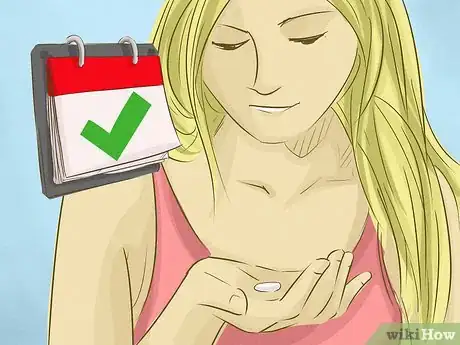




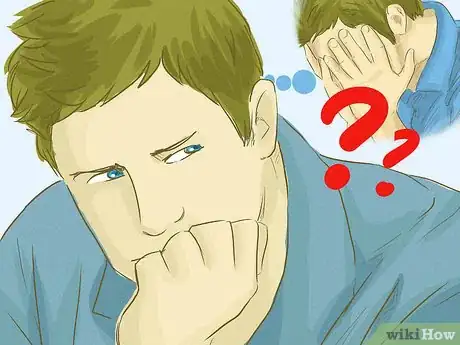
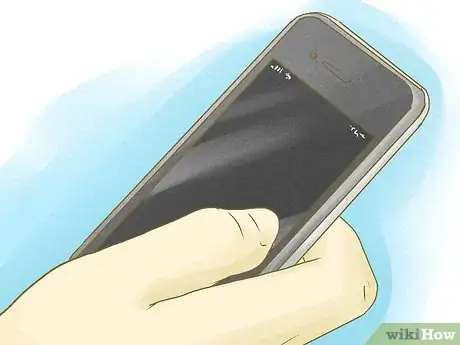

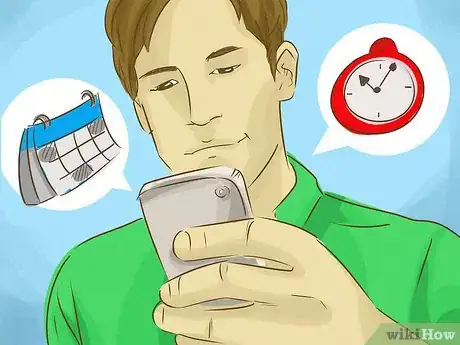

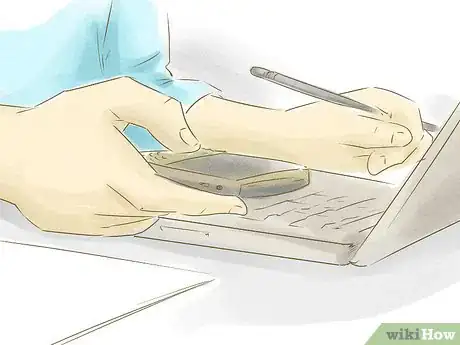
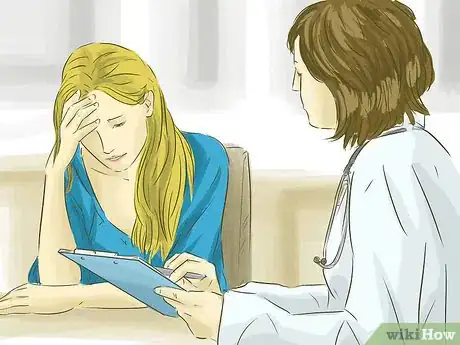
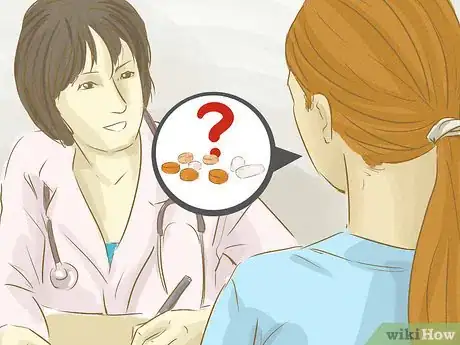
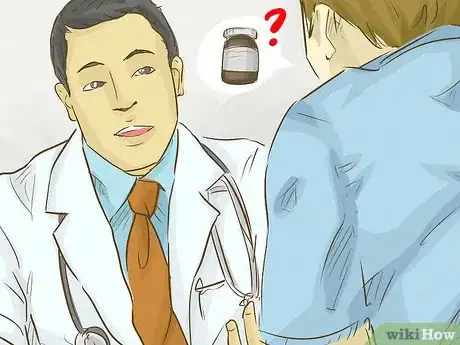
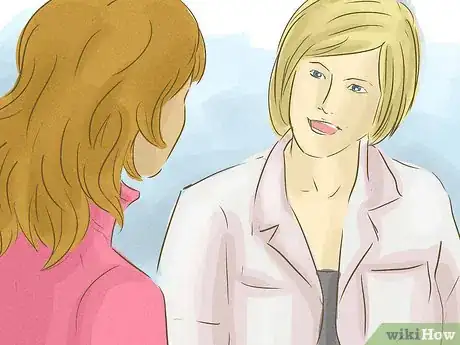
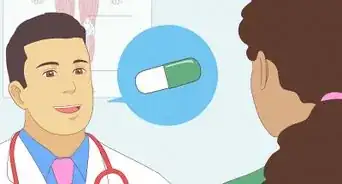




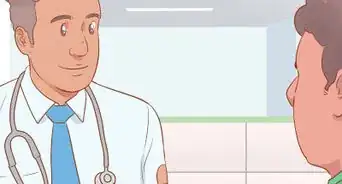
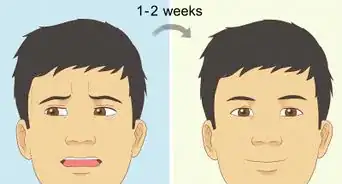
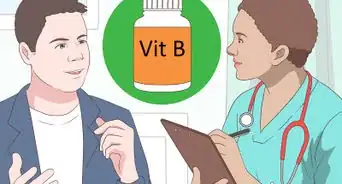
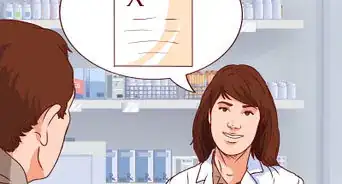


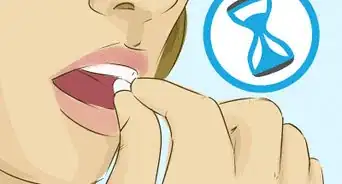
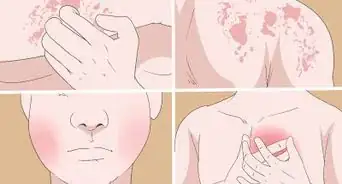








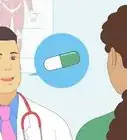






































Medical Disclaimer
The content of this article is not intended to be a substitute for professional medical advice, examination, diagnosis, or treatment. You should always contact your doctor or other qualified healthcare professional before starting, changing, or stopping any kind of health treatment.
Read More...